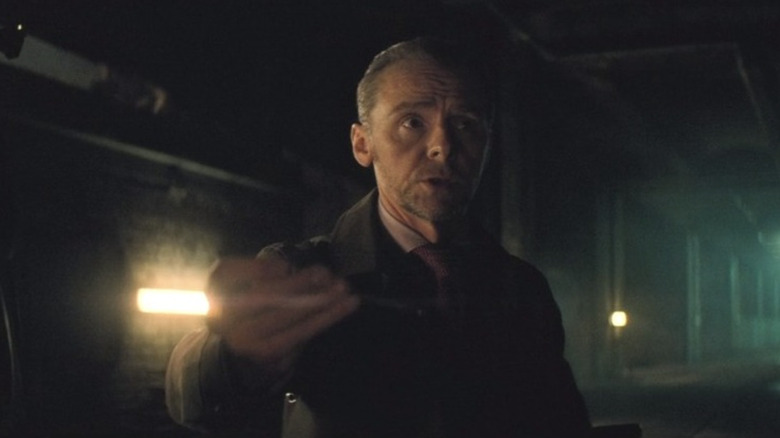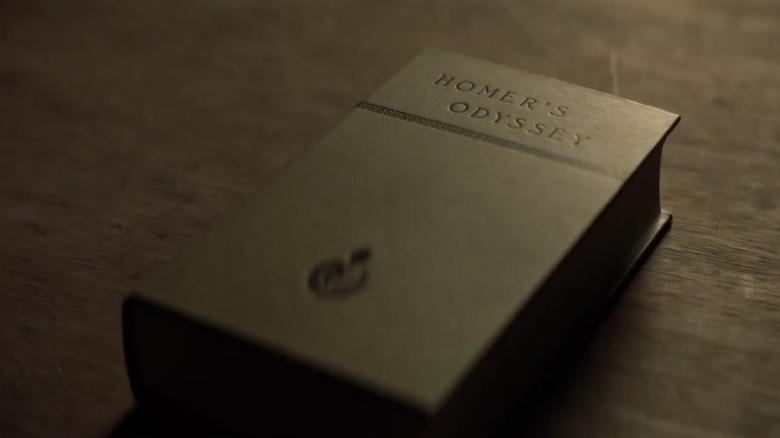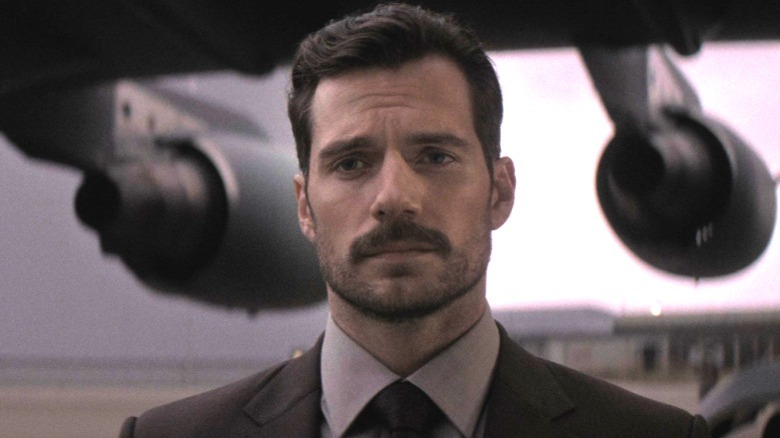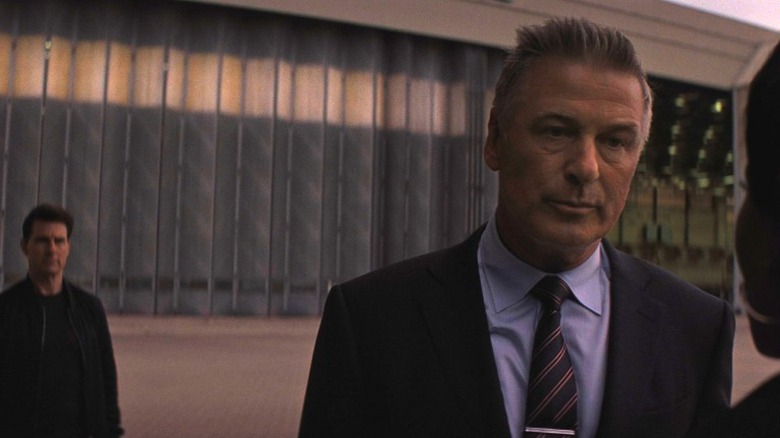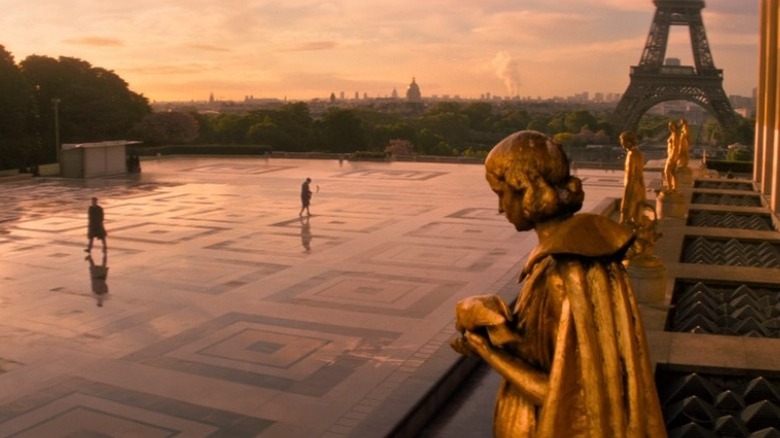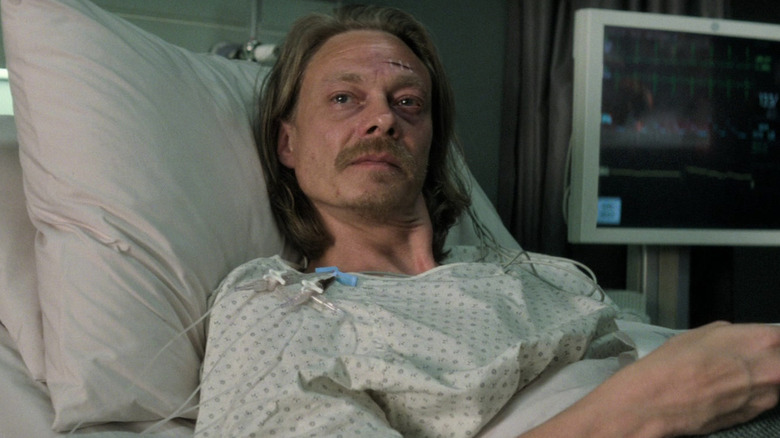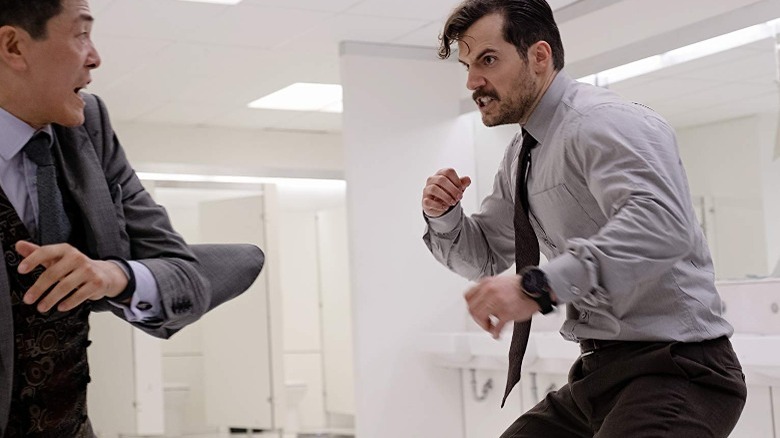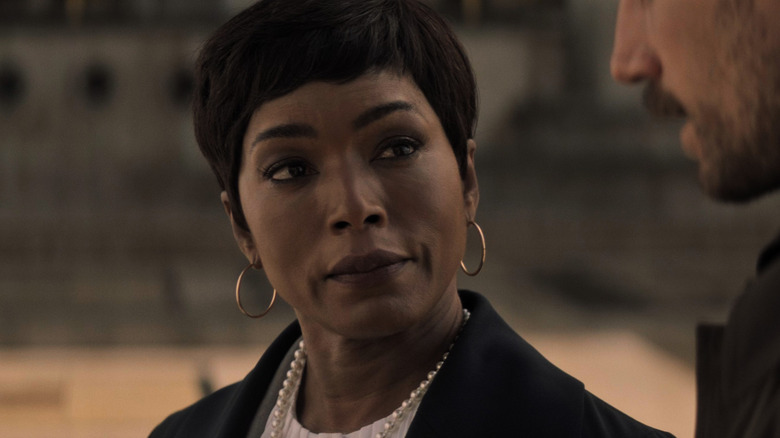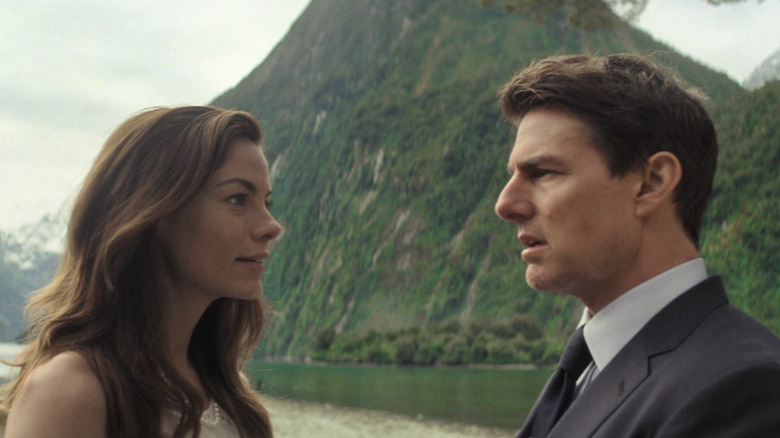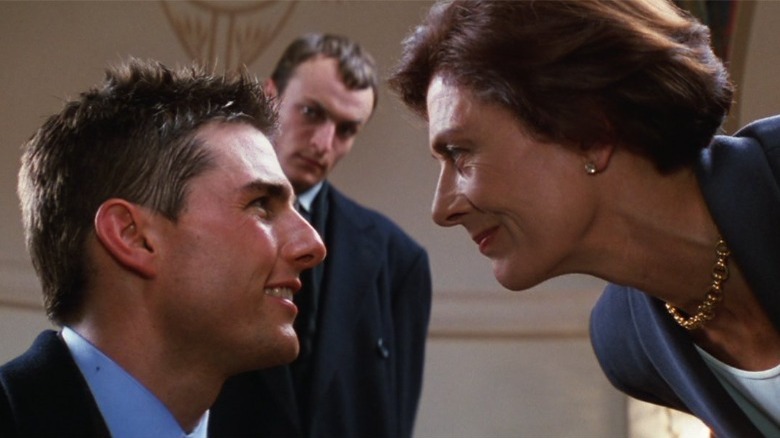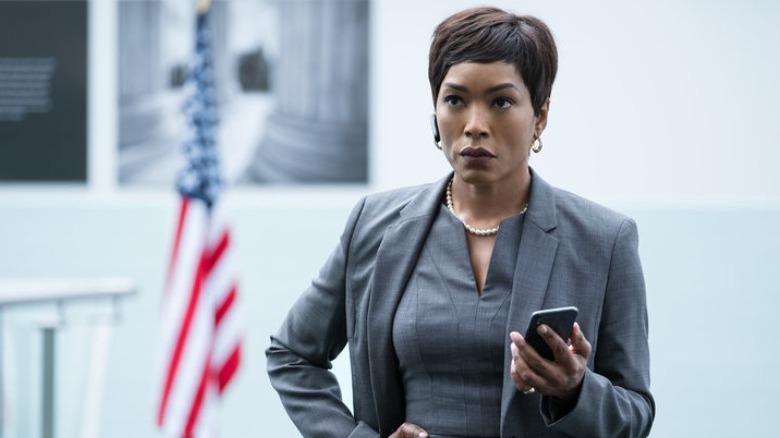Mission: Impossible - Fallout Things You Only Notice After Watching It More Than Once
The "Mission: Impossible" franchise has come a long way from its origins as a popular, campy TV spy thriller in the 60's. After a brief TV revival in the late 80's, it was reborn as a movie franchise and Tom Cruise vehicle with Brian De Palma's 1996 classic "Mission: Impossible. But over time, the movies have progressively become less about mood and more about explosions and extremely dangerous stunts, which Cruise famously volunteers to do himself.
The series' sixth movie, "Mission: Impossible — Fallout," sees Ethan Hunt (Cruise) and friends deal with some of the most extreme challenges yet, amidst a plot of twists and double crosses that adorns the action set-pieces like incoherent tinsel on a Christmas tree.
To revisit "Fallout" for a second viewing, with even just the broadest plot twists in mind, is a fundamentally different viewing experience. You realize the ways in which the movies keep the cheesy spirit of the 60's franchise alive, as entire scenes are clearly reverse-engineered to end in dramatic reveals. Twists are stacked on top of one another in a breathless race to keep us gasping and they lead to a lot of second guessing when you know them in advance.
The end result is one of the best movies in the series, so these are the things about "Mission: Impossible — Fallout" you only notice after watching it more than once.
Warning: spoilers below.
Not quite a Star Trek reference
You might recognize Simon Pegg, who plays technician-turned-field-agent Benji Dunn, from his role as Scotty in the new "Star Trek" movies. Early on in "Mission: Impossible — Fallout," it seems like the screenwriters throw in a little Easter egg for "Star Trek" fans. You'll find it in the scene where Benji confirms that the plutonium that the IMF team is attempting to purchase is the real deal. Benji holds a piece of metal up to the plutonium core and identifies it as a "beryllium rod," which reacts with the plutonium to spike the Geiger counter app that Benji has on his phone.
"Beryllium" may seem like a "Star Trek" reference, but hardcore sci-fi lovers might recognize that it actually comes from "Galaxy Quest," the cult classic spoof of "Star Trek." In "Galaxy Quest," there's a key plot point involving the acquisition of a "beryllium sphere" to fix a damaged spacecraft. It's easy to make the mistake, since "Galaxy Quest" is a loving ode to the specific positivity of the "Star Trek" fandom.
Or perhaps in "Fallout," the writers were just attempting some scientific verisimilitude: Beryllium has many applications in nuclear science due to its "neutron multiplication capacity" (via Taylor & Francis Online).
The Odyssey parallels
Re-watching "Mission: Impossible — Fallout," it seems to be quite intentional that Ethan receives his mission in a hollowed-out copy of Homer's "Odyssey." It serves as a kind of meta-commentary on what a larger-than-life hero Ethan Hunt has become as the movies have continued. Consider that the most thrilling sequence in the first "Mission: Impossible" involves Ethan preventing a drop of sweat from falling on the floor. Decades later, in "Fallout," he's improbably surviving mid-air helicopter crashes and scaling the face of a cliff in a matter of seconds. In other words, he's basically become a Greek legend.
Like Odysseus in Homer's epic poem, Ethan has also been separated from his beloved wife by fighting an endless war that has lasted decades. The endings of the stories diverge, however. Ethan and his wife Julia (Michelle Monaghan) split up and he's happy for her new marriage, while Odysseus returns home to find his wife Penelope beset by many suitors, who are quickly driven away so the long-separated lovers can reunite.
Everyone goes rogue all the time
Pretty much all of the best spy movies of all time involve some sort of double-cross or betrayal and often repeated ones at that. But taken all together, the world of the "Mission: Impossible" movie franchise has grown to include an absolutely staggering number of rogue agents and turncoats from the world's intelligence agencies. It's so many that you have to wonder if the governments of the world need to either up their pay or at least invest in a better Human Resources department. By the time we learn that C.I.A. agent August Walker (Henry Cavill) is actually the terrorist John Lark, it's just a meaningless feather settling on top of a mountain of traitors.
Perhaps in an attempt to avoid making a real-life country the villain, both "Fallout" and its predecessor "Mission: Impossible — Rogue Nation" center around an entire network of defected intelligence agents run by Solomon Lane (Sean Harris), who is a rogue British MI6 agent. Presumably every spy agency has their own version of the IMF's policy where "the Secretary will disavow all knowledge" of their actions if caught. This policy doesn't seem to breed a lot of loyalty in anyone.
Ironically, Ethan Hunt is the only main character that's dependably loyal to his country, even though he's been disavowed by both his agency and country multiple times throughout the course of six films.
The mission should be shut down several times
While other movies in the series get a little more into the Impossible Missions Force and its lack of government oversight, a second viewing of "Fallout" does make you wonder why the mission isn't shut down during any of the various moments when it goes completely wry. Before the credits even roll, Ethan has chosen to save the life of his team instead of securing three missing plutonium cores. He gets roundly criticized for changing his priorities, but is still kept on the assignment despite bringing the world closer to the brink of World War III.
In general, none of the "Mission: Impossible" movies can stand under too much scrutiny. They're more concerned with getting us to the next set piece for Tom Cruise to risk his own life than logically explaining the plot. But in "Fallout," the Secretary of the IMF himself Alan Hunley (Alec Baldwin) gets killed and even then, the mission doesn't pause to regroup. Why is there no additional oversight? Why aren't any other military resources called into help the IMF team in Kashmir, with a third of the entire world's water supply at risk? A second viewing of "Mission: Impossible — Fallout" may bring up these questions, but don't expect it to answer them.
Paris is strangely free of tourists
The entire middle section of "Mission: Impossible — Fallout" is set in Paris. Several action sequences and clandestine meetings take place in front of the city's most well-known landmarks. But when you watch the movie a second time, especially if you've ever been lucky enough to visit the "City of Light" yourself, you inevitably notice there aren't many tourists in any given scene, which is perhaps more unbelievable than any of Ethan Hunt's wild stunts.
It's understandable that the streets of Paris are "miraculously" un-congested during the multiple motorcycle and car chases, where the traffic around the famous Arc du Triomphe is pretty light. But there's a scene where Walker meets up with CIA director Erika Sloane (Angela Bassett) outside the Palais de Chaillot in a plaza where golden statues overlook one of the most stunning views of the famous Eiffel Tower. It's just a little too much to suspend disbelief and imagine that it would be empty at any hour, let alone during a breathtaking sunset.
Everything about the fake hospital room scene is nuts
The scene when Ethan, Luther (Ving Rhames), and Benji fool evil scientist Nils Debruuk (Kristoffer Joner) in a fake hospital room is vintage "Mission: Impossible." It's pure campy fun in the spirit of the original show, but it makes absolutely no sense when you watch it again and think about how unlikely it was to work. The entire ruse — from faking footage of the nuclear bombs already having gone off to pretending to read Walker's manifesto on the air — is just to get Delbrook to give them the code to a phone that will help them track down John Lark. But what if Debruuk had just refused to cooperate? The IMF team still has no leverage over him in the end.
It also would be pretty easy for Debruuk to see through their deception. To get the manifesto read "on air," Ethan makes a phone call, but he doesn't use the words "CNN" or "Wolf Blitzer," which would seem kind of important since "Wolf Blitzer" (actually Benji) is handed the manifesto merely seconds later.
Not to mention, it's wholly unnecessary for the walls of the fake hospital room to fall away entirely all in one moment, which serves no purpose other than to really rub it in Debruuk's face that they tricked him.
Walker/Lark gets beat up by his own decoy
Perhaps the highlight of "Mission: Impossible — Fallout" is the brawl in the bathroom that Ethan and Walker have with a man they believe to be John Lark (played by veteran stuntman Liang Yang). It's hands down one of the most epic movie fights of the 21st century. The stranger, who turns out to be a decoy for the real John Lark in the end, fights the super-heroic Ethan Hunt and Superman-with-a-mustache-himself to a complete standstill before being taken out by Ilsa (Rebecca Ferguson) with an abrupt shot to the head.
But when you learn that Walker was in fact John Lark, and so hired the decoy, you have to question his choice upon a rewatch of "Fallout." If Walker knows that he'll be part of the IMF mission to drug "John Lark" and take his place, why would he hire such a tough decoy to take down? Is the decoy a member of the "Apostles," Solomon Lane's network of rogue spies, which would account for his extensive martial arts training? Perhaps it was an intentional move, to really throw people off the John Lark scent, but if so, Walker nearly gets himself killed trying to maintain his own fake cover.
Does the CIA outrank the IMF?
"Fallout" is the first movie in the "Mission: Impossible" film series that assumes that you've seen the previous installment, "Rogue Nation." The main arc of its plot is essentially a continuation of Ethan's rivalry with Solomon Lane, which is established in "Rogue Nation." But lost in the shuffle is the power struggle between the IMF and the CIA that was seemingly already settled before. Secretary Hunley of the IMF, himself a former CIA director, saves the IMF from being folded into the CIA after the events of "Rogue Nation."
But in "Fallout," CIA director Sloane apparently still has the authority to pull rank on Hunley. She insists that Walker accompany Ethan on the mission, which essentially makes it a joint IMF/CIA operation. She later schemes with Walker to find incriminating dirt on Ethan in order to swoop in and shut the op down, which she still tries to do even after its revealed that Walker, her most trusted lieutenant, is a traitor and madman. So, is the IMF part of the CIA or not? With Hunley's untimely death (at Walker's hand, no less), the distinction appears to be arbitrary.
Julia will always be a liability for Ethan
"Mission: Impossible — Fallout" ends in a happy place: Ethan has once again saved the day, and his ex-wife Julia reassures him that everything is cool despite the fact that his work once again has endangered her life. She understands that Ethan's special power of running really fast and solving international conspiracies comes with the great responsibility of living a life of constant danger. She is even grateful that her life on the run has lead her to very fulfilling humanitarian aid work. She smiles and is framed by the setting sun, and the credits roll.
But the moment doesn't really address the elephant in the hospital tent: As long as Julia's alive, she'll always be a liability for Ethan. Solomon Lane proved that there's nowhere so off-the-grid that a vengeful madman can't find you and put you back in harm's way. And unfortunately, Ethan has a real penchant for making vengeful madman enemies. While Julia might be marginally safer being separated from Ethan, the events of "Fallout" prove that no distance can really protect either of them from their relationship and that perhaps they ended their marriage for no reason, since Ethan will keep protecting her anyway.
The White Widow's mother
Luther and Benji are the only two members of Ethan's IMF team to consistently survive, which checks out in this series that's pretty light on continuity. Tom Cruise is the thread of the "Mission: Impossible" franchise, which leaves room for other characters to come and go. So, it's surprising to realize that "Mission: Impossible — Fallout" casually drops a connection to the original 1996 movie, which is easy to miss on a first viewing.
In "Fallout," we meet Alanna Mitsopolis a.k.a. the White Widow (Vanessa Kirby), who is the daughter of Max Mitsopolis (Vanessa Redgrave), an illegal arms dealer in the original "Mission: Impossible." In "Mission: Impossible," Max plays a key role in the attempt to acquire a list of IMF agents and although she's handed over to the CIA, she works out a deal to remain free.
Her daughter Alanna has apparently inherited both her mother's arms dealer position and the friendly relationship with the CIA more than two decades later. Although she doesn't know what Ethan Hunt looks like, which allows her to briefly mistake him for John Lark in this nice callback to the original film.
The shameless fake out at the end
After already faking us out (along with Nils Delbruuk) by pretending some nuclear bombs went off, "Mission: Impossible— Fallout" hints briefly at another explosion during a key moment in its finale. Obviously, it's a bit much to think that the crowd-pleasing "Mission: Impossible" franchise would go full-on "Dr. Strangelove" and end as bleakly as one of the best satires of all time.
But for a moment, just after we've seen the countdown end and Ethan stuck several feet below the detonator on the cliff face, "Fallout" frames the sunset just over his shoulder in such a way that we think that he's failed and a mushroom cloud is forming.
Of course, he took the pin out of the detonator just when his team cut the wires and everyone was fine. But watching "Fallout" a second time, you notice what a cheap move it is to fake us out after such an intense and tension-filled action sequence of failing helicopters and near hangings. "Mission: Impossible — Fallout" squeezes one more moment of terror out of us before finally letting us breathe.
Sloane's message at the end is nonsensical
At the very end of "Mission: Impossible — Fallout," CIA Director Sloane leaves Ethan a voicemail where she apologizes for doubting him. She was one of several characters that faulted him at the beginning for prioritizing the lives of his team over the greater good. But after Ethan and his team prevent a disaster in Kashmir by literally less than a second, she's convinced of his approach: "We need people like you, who care about the one life as much as they care about the millions. That way I never have to."
Wait, what? While there's some sort of logic in the idea that a field agent like Ethan is better equipped to care about individual lives than someone with the vast purview of an agency director, you'd still want the executive in charge of an entire intelligence agency to be able to think globally and locally at the same time. It's a strange attempt to tie together a theme that doesn't get explored outside of these two conversations from a character that isn't developed enough to have a real point of view.

